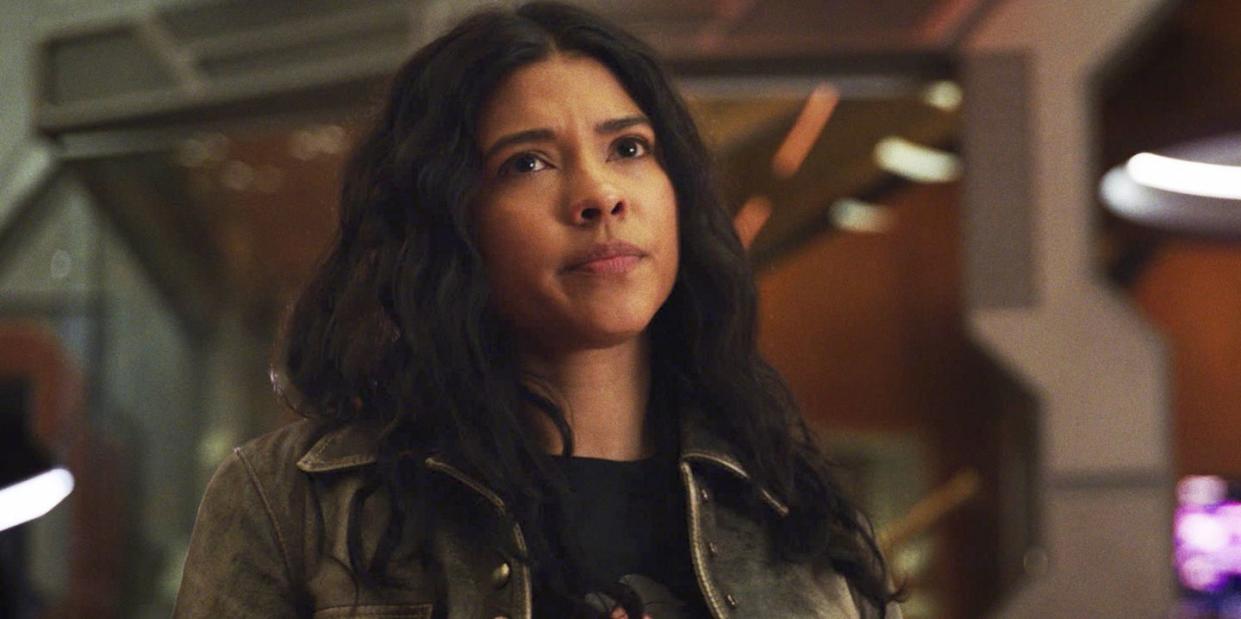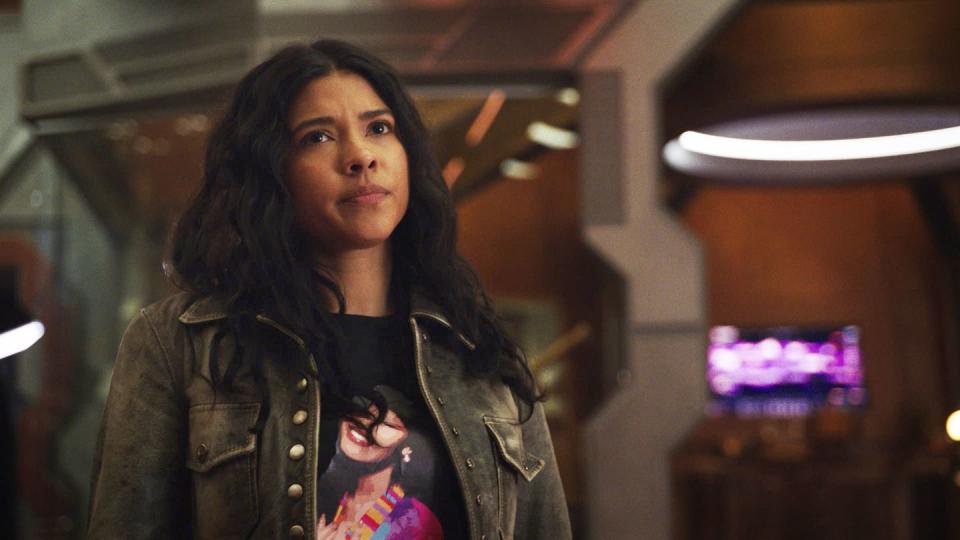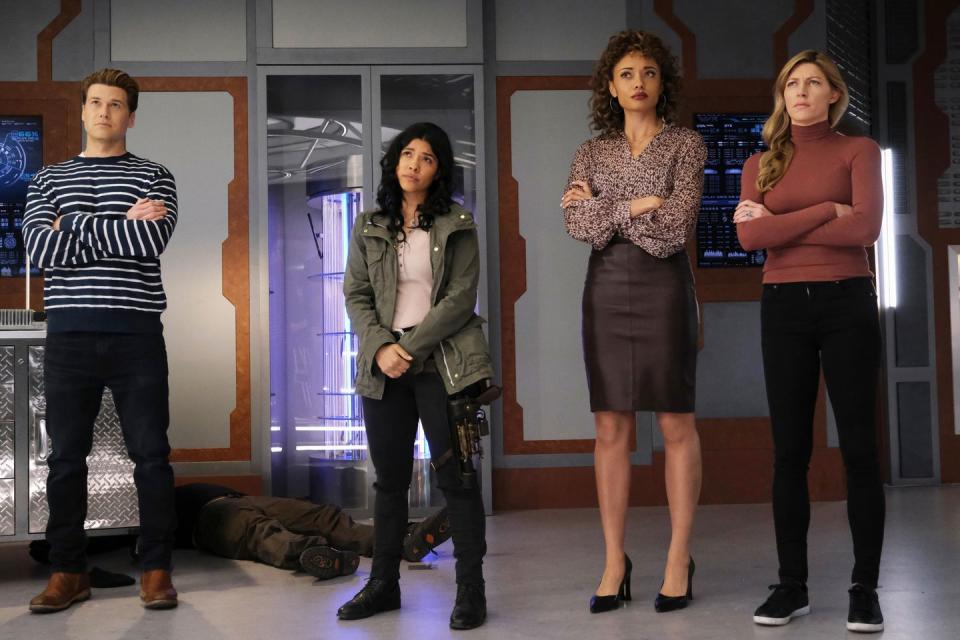'Legends of Tomorrow' Just Introduced TV's First Asexual Superhero

DC's Legends of Tomorrow season 7 episode 10 spoilers follow.
DC's Legends of Tomorrow is one of the best, and queerest, shows out there – yet not enough people are talking about it. That's just a fact. But it's also weirdly fitting that a story like this would still be overlooked, seven seasons in, because that's the whole point of the Legends. They're misfits brought together to protect time, a mission that is never fully understood or appreciated by anyone outside of the Waverider.
But it's about time the Legends got their due. Because, despite its humble, somewhat basic origins, The Best Arrowverse Show? has become thrilling and unpredictable in ways that few others on any network, let alone The CW, can muster.
Along with all the Beebo's and random Obama cameos, each season has also become progressively queerer (and inclusive in general, really). Last year's Sara and Ava wedding was not just a joy for Avalance fans everywhere, but it was also the culmination of so much queer joy that few shows of any kind have celebrated on screen before, particularly within the superhero genre.

Midway through season seven, basically half of the lead Legends have now been confirmed as LGBTQ+ in some way, and the latest episode has added another in the form of Esperanza Cruz, AKA Spooner, who proudly comes out this week as an asexual woman of color.
The scene in question is a small but powerful one that takes place between Lisseth Chavez's character and Zari 2.0.
While searching for something to bond on, Zari suggests a game of 'F**k, Marry, Kill'. At first, she leads with the men, to which Spooner replies they're not really her thing. In the spirit of this show's effortless acceptance of all things queer, Zari then asks if Spooner would be interested in sleeping with some of their female compatriots instead. Again, Spooner isn't keen.
?? SPOILER??
.
.
.
SPOONER ES ASEXUAL ?? #LegendsOfTomorrow pic.twitter.com/hipt10VV70— Legends Of Tomorrow Argentina (@dclegendsARG) January 27, 2022
Chavez's gun-toting hero brushes this off though, suggesting that this might be because the aliens who abducted her might have "messed her up" in some way.
Zari immediately rejects this, pointing out that it's perfectly normal to not be sexually attracted to men or women. What Spooner is describing here is asexuality, even though she herself hadn't previously recognized it as such.
There's so much to love about this scene. Zari's explanation of asexuality is simple enough for those who have never been introduced to the term, yet time is still taken to affirm these feelings don't mean that Spooner is "broken". Being ace is simply another aspect of queerness, and being able to finally label herself as such seems to lift Spooner up in the most beautiful way.
Zari also points out that asexual people often desire romance still, putting to bed a common misconception about the ace community as a whole. And just by virtue of being human, Spooner also avoids the sci-fi cliche that often links asexual characters with a lack of humanity, whether they're aliens who don't have the capacity for sex, or something else entirely.
Knowing that former Legend Maisie Richardson-Sellers, who identifies as queer, also directed this episode is just the icing on the cake.
In the grand scheme of this episode's wider narrative, Spooner's coming out doesn't play a huge role. But for Spooner herself, a character who has recently been sidelined more often than not, it's a very big deal. And beyond even that, this moment heralds a huge shift in queer representation on screen, both within the superhero genre and TV as a whole.

As such, you would expect a great deal of fanfare, but Spooner's revelation wasn't advertised or discussed in interviews prior to the episode's launch. There was no tokenistic bid for attention. It simply happened in a beautiful, organic way, as these moments often do in real life.
So it falls to us to celebrate this groundbreaking episode instead because, let's face it: the superhero genre isn't exactly known for embracing queerness of any kind, let alone asexuality.
Aside from Legends and Arrowverse companions like Batwoman, comic book shows and films that star LGBTQ+ leads are still few and far between. Even in the source material, queer characters are only now becoming more prevalent, and asexual representation is still lacking.
That's why the few instances of asexuality seen in shows such as Emmerdale, Sex Education and BoJack Horseman are so noteworthy – and that's why asexual fans were outraged by Riverdale's decision to erase this aspect of Jughead's identity when it first launched in 2017.
But now we can add DC's Legends of Tomorrow to this small but growing list of shows that have finally started to acknowledge and embrace asexuality as something valid, something that doesn't need fixing. As if this show wasn't legendary enough already.
You Might Also Like
